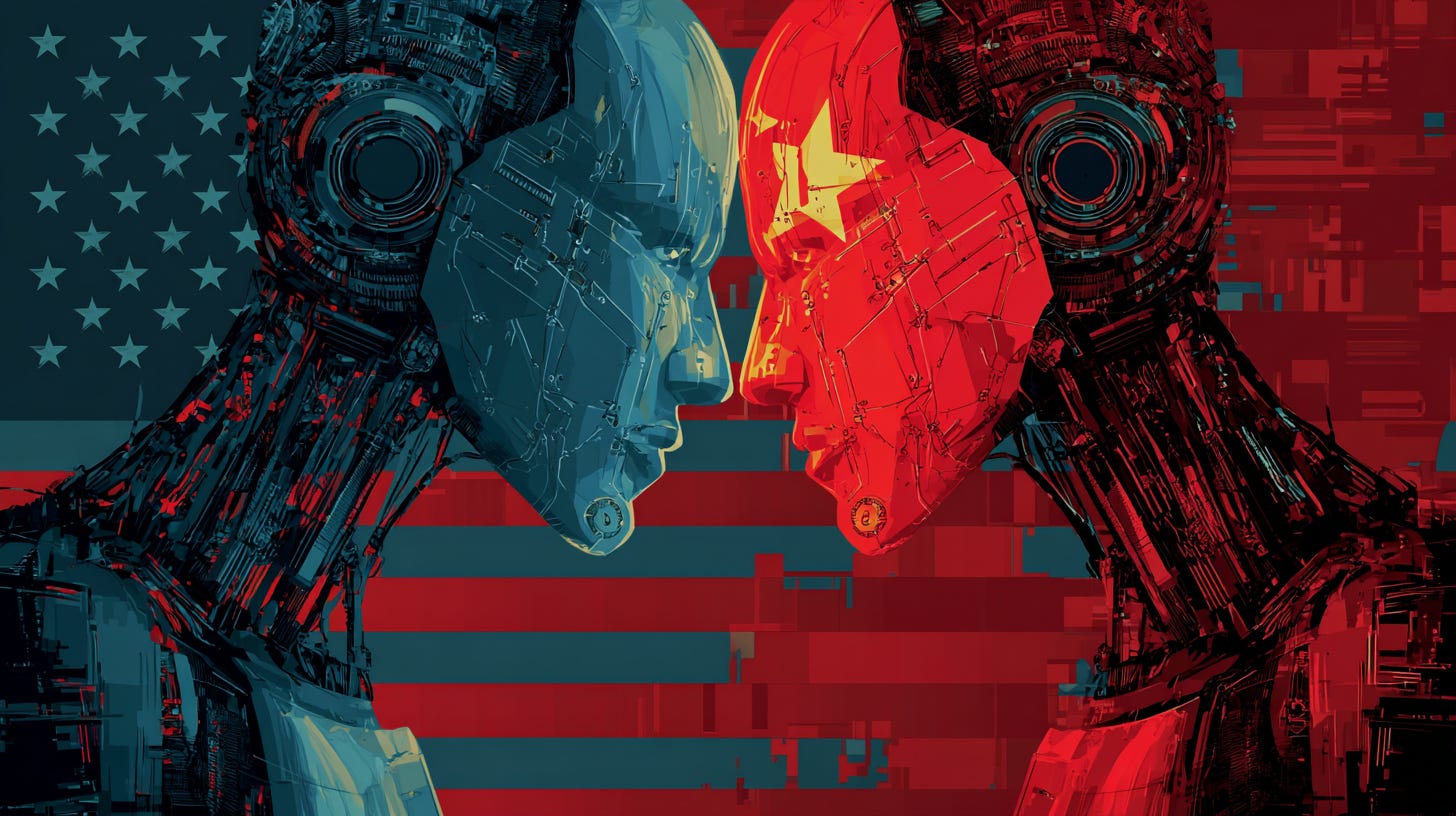🏁 Mimicking China isn't how the US should race against China
America should lean harder into its own entrepreneurial capitalist strengths. Why doesn't Washington realize this?
My fellow pro-growth/progress/abundance Up Wingers,
I consider the race for 21st century, techno-economic dominance as, broadly, competition between market capitalism and state capitalism. But much of Washington, including the current fellow sitting in the Oval Office, might not see things that way.
It's a real bummer that Donald Trump’s economic strategy is starting to look uncomfortably like … the Chinese model it claims to counter. The US president has attempted to push out corporate leaders and Wall Street economists, extracted “golden shares” in firms such as U.S. Steel, claimed stakes in critical-mineral producers, such as a 15-percent holding in MP Materials, and promised to steer $1.5 trillion in investment pledges from allies.
A ripped-from-the-headlines example from today’s New York Times: “Trump Has Made Himself Commander in Chief of the Chip Industry.” As reporter Tripp Mickle writes:
At an Oval Office meeting last week, President Trump dangled an offer to Jensen Huang, the chief executive of Nvidia. Mr. Trump said there would be a price for granting Nvidia the licenses it needed to sell artificial intelligence chips to China. … Mr. Trump, who recounted the meeting during a press event on Monday, agreed to the counterproposal. Two days later, the administration granted Nvidia the licenses it wanted, with the unorthodox payments expected to go to the government. The negotiation was the most prominent example of Mr. Trump’s blunt interventions in the global operations of the chip industry’s most powerful companies. … In just eight months, Mr. Trump has made himself the biggest decision maker for one of the world’s most economically and strategically important industries, which makes key components for everything from giant A.I. systems to military weapons. And he has turned the careful planning of companies historically led by engineers into a game of insider politics.
Tariffs, subsidies, and presidential fiat have become the main levers of what Wall Street Journal columnist Greg Ip calls “state capitalism with American characteristics,” citing much of the aforementioned evidence in a new column.
(This economic policy turn, by the way, did not begin with Trump, as Ip correctly adds. The Biden administration also sought to reshape industry, using the Inflation Reduction Act’s $400 billion in clean-energy loans and the Chips and Science Act’s $39 billion in semiconductor subsidies — moves that gave Washington leverage over corporate decisions.)
The wrong direction
But, hey, if you can’t beat ‘em, join ‘em, right?
It seems to be a core belief of MAGA nationalists that China has figured out a new and better way to do technological progress and economic growth. The early 2000s pupil has become the 2020s master. The proof, for them, is in the pudding of aggregated national data where the Chinese economy has been growing twice as fast as the American economy — as Trump has previously noted — even if slower than the double-digit pace seen earlier this century.
(Does this view conveniently ignore how a) China’s acceleration started from a very low base and b) the GDP numbers have been long questioned by outside economists? Sure does!)
That said, China’s command-driven growth formula is cracking. A new Federal Reserve analysis finds that the country’s undoubtedly spectacular rise — from barely five percent of US per capita GDP in 2004 to about 20 percent today — was powered by massive investment in factories, booming exports, and a swelling labor force.
Alas, those engines are now sputtering. Productivity growth has been flat for years, exports face global headwinds, the population is aging rapidly, and a property market slump is draining confidence.
Beijing’s answer has been to double down on innovation. It now devotes R&D spending close to America’s share of GDP, according to the report, and churns out patents and scientific papers at staggering volumes. It also has carved out global positions in electric vehicles and artificial intelligence.
Yet the Fed study underlines that scale isn’t the same as technological leadership. Quantity, though hardly unimportant, isn’t quality.
Basic research — the kind that seeds future breakthroughs — still gets far less attention in China than in America.
Many Chinese patents are registered only domestically rather than in the world’s largest patent offices — the US, Europe, Japan, and South Korea — which makes them less likely to be commercially valuable or competitive in global markets.
The country’s share of highly cited scientific papers lags behind the US.
America retains a clear edge in high-value fields such as biotechnology and medical science.
Beijing’s big mistake
Here’s their trouble: China’s innovation push is being shaped by the same top-down industrial policy that powered its manufacturing boom. Heavy subsidies, protection for state-owned firms, and politically driven investment often steer capital toward politically favored projects rather than commercially viable or scientifically transformative ones.
Such an approach can deliver quick wins and flashy metrics that impress the economic nationalists in Washington, but over time it risks stifling the entrepreneurial energy and risk-taking culture needed for sustained innovation.
The paper’s gentle critique:
China has built tremendous innovative capacity that bodes well for a prospective transformation into an innovation-based economy. That said, such an outcome is not assured as the myriad of policies Chinese policy makers have been adopting over the years to promote industrial production and research has also created considerable distortions in the economy, the downsides of which are not discussed in this note.
All this should be a cautionary tale for Washington. America became the world’s innovation leader not by centralizing industrial decisions in the White House, but by fostering open competition, encouraging private risk capital, and funding basic science that can flourish anywhere from a university lab to a garage startup. Why do I even have to point any of this out, really?
If Trump’s aim is to outpace China, the surest way is to lean harder into America’s bottom-up strengths. That means leaving control of corporate decision-making in the hands of CEOs, streamlining regulation to reward new entrants and making it easier to build, and funding sustained investments in foundational research. (The are key themes in my 2023 book, The Conservative Futurist: How To Create the Sci-Fi World We Were Promised.
Beijing’s state-led model is already bumping up hard against its limits. Definitely one import America should reject.
As Congress Does Less, The Courts Are Doing More
Breaking news: The Dispatch has acquired SCOTUSblog, the gold standard in Supreme Court analysis.
Reliable coverage of the Supreme Court has never been more important. With an unbridled executive branch and a Congress eager to surrender its constitutional prerogatives, the federal judiciary is playing an increasingly important role in shaping the country’s direction.
Join 600,000 loyal readers and check out The Dispatch today. No insulting clickbait, no false outrage, no annoying auto-play videos—just reliable journalism that helps you understand the big decisions that will shape our nation’s future.
Faster, Please! readers: Take 25% off a Dispatch membership today
Micro Reads
▶ Economics
The Sluggish Renaissance of U.S. Manufacturing - St. Louis Fed
▶ Business
Apple has a new AI problem: Elon Musk - Fortune
▶ Policy/Politics
Trump Thinks He Is the C.E.O. of Everything. Awesome. - NYT Opinion
▶ AI/Digital
ChatGPT-5 Hasn’t Fully Fixed Its Most Concerning Problem - Bberg Opinion
The Looming Social Crisis of AI Friends and Chatbot Therapists - Derek Thompson
Reading the Mind of the Machine: Why GPT-5’s Chain-of-Thought Monitoring Matters for AI Safety - AEI
Prioritizing Fundamental Capabilities for the Intelligence Age - Essential Technology
▶ Biotech/Health
RFK Jr.’s “Scienze” - Beyond the Noise
▶ Clean Energy/Climate
The Nuclear Test That Britain Can’t Afford to Fail - Bberg Opinion
▶ Robotics/Drones/AVs
▶ Space/Transportation
We Need a 'Mini-Manhattan Project' for Nuclear Electric Propulsion - RealClearScience
▶ Up Wing/Down Wing
▶ Substacks/Newsletters
GPT-5 Set the Stage for Ad Monetization and the SuperApp – SemiAnalysis
Corporations aren't the reason your rent is too high - Noahpinion
Trump’s awful turn against mRNA vaccine research - Slow Boring
Why Trump Must Act Now to Secure Global Agricultural Leadership - The Ecomodernist
Nathaniel Hawthorne on How the Invention of Iron Stoves Ruined Society - Conversable Economist
AI & Jobs: Enter Populism? - Threading the Needle
Employer-Sponsored Green Card Processing Takes 3.4 Years, All-Time High - Laissez-Faire, Laissez-Passer
▶ Social Media
On AI Improvement - @GestaltU
On AI and R&D - @nikolaj2030
On Humanity and Space Ethics - @PettitFrontier
On Nuclear and Risk - @ShanuMathew93
On GPT-5 pro’s IQ - @chatgpt21
On Child Mortality and Human Wellbeing - @taoburr
On Improving AI Efficiency and Frontier Labs - @Afinetheorem



